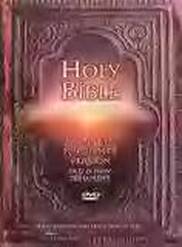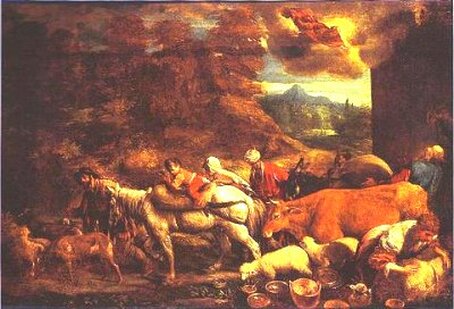Acts 7:1-19
Lesson 231
Read both the "King James Bible" and the "New Living Translation."
In this lesson:
Stephen gives the Sanhedrin a history lesson on the Jewish people.
Stephen's address runs through lesson 234.
Many Bible scholars consider Stephen's sermon one of the finest ever given.
Abraham journeying to the Promised Land.
Who were -
Abraham -
The founder of Judaism, the father of all Jews (Romans 4:11-16; Galatians 3:7), spiritual forefather of Christians (Galatians 3:29), and a "friend" of God (2 Chronicles 20:7; Isaiah 41:8; James 2:23). Abraham was also called the "Father of a multitude," "exalted Father," and Abram (Genesis 15:1; 17:4-5). Born in Ur (present-day Iraq), Abraham is perhaps the greatest of the Old Testament personalities. His story is part of almost every eastern religion, including Islam, where he is considered the father of all Arab peoples through his son Ishmael. A man of tremendous faith, Abraham left his home and family because God asked him to (Genesis 12:1; Acts 7:2-4). Then, God asked Abraham to sacrifice his son Isaac as a test. Trusting God, Abraham set off to Mount Moriah, a hill near Jerusalem, to obey (Genesis 22:1-10). Many Bible scholars believe Mount Moriah is the same hill where Jesus was later sacrificed. However, many Jews disagree. They believe that the Temple's sacrificial altar was built over the site where Abraham prepared to sacrifice his son. As Abraham prepared to sacrifice his son, God sent an angel to save the boy (Genesis 22:11-13). Abraham's willingness to obey earned him God's promise (the Abrahamic Covenant) to make his descendants (the Israelites) a great and populous people (Genesis 17:2-7; 22:16-18; 26:4; 24) and to bless the Gentiles through him (Genesis 12:2-3; 15:1-21; 18:18; 22:18; 28:14; Exodus 32:13). Abraham's deeds sometimes disappointed God, but he never lost his righteousness because it is never deeds that earn righteousness; it is faith (Genesis 15:6). Abraham died at the age of 175 (Genesis 25:7) and was buried alongside his wife Sarah in a cave at Machpelah (Genesis 23:9; 25:7-10). Centuries later, a Christian church was built over the cave. Subsequently, the church was converted into an Islamic Mosque. Jesus' roots go back to Abraham (Matthew 1:1-16), proving that His lineage dates back to the beginning of the Jewish nation. You can read more about Abraham in Genesis 11:26-25:34.
Jacob -
Also called Israel. With his twin brother Esau, Jacob was the son of Isaac and Rebekah, and Abraham's grandson. The twelve tribes of Israel are named after Jacob's sons. Jacob, Isaac, and Abraham are three of the Old Testament's most important figures. God chose Jacob over his brother Esau to fulfill His promise to Abraham to make Israel a great and populous nation (Genesis 48:1-22). With his mother's help, Jacob conned his twin brother Esau out of his father's blessing and birthright (Genesis 25:27-34; Genesis 27:1-45). This included the land of Canaan promised to Jacob's father Isaac and grandfather Abraham. Esau vowed to kill Jacob for his trickery (Genesis 27:41), forcing Jacob to flee to his Uncle Laban in Haran. On his way to Haran, Jacob had a vision of climbing a ladder ("Jacob's ladder") to heaven. When he reached the top, God repeated His promise to Isaac and Abraham (Genesis 28:12-14). Jacob and Esau eventually reconciled, and Jacob became a shining example of faith. Even when dying, he never doubted God's promise to make Israel a great nation (Hebrews 11:21-22). Jacob died at the age of one hundred and forty-seven (Genesis 47:28). In time, Moses led Jacob's descendants out of slavery in Egypt. Forty years later, Joshua led them into the promised land, thus fulfilling God's promise. You can learn more about Jacob in Genesis 25:1-37:36.
Abraham -
The founder of Judaism, the father of all Jews (Romans 4:11-16; Galatians 3:7), spiritual forefather of Christians (Galatians 3:29), and a "friend" of God (2 Chronicles 20:7; Isaiah 41:8; James 2:23). Abraham was also called the "Father of a multitude," "exalted Father," and Abram (Genesis 15:1; 17:4-5). Born in Ur (present-day Iraq), Abraham is perhaps the greatest of the Old Testament personalities. His story is part of almost every eastern religion, including Islam, where he is considered the father of all Arab peoples through his son Ishmael. A man of tremendous faith, Abraham left his home and family because God asked him to (Genesis 12:1; Acts 7:2-4). Then, God asked Abraham to sacrifice his son Isaac as a test. Trusting God, Abraham set off to Mount Moriah, a hill near Jerusalem, to obey (Genesis 22:1-10). Many Bible scholars believe Mount Moriah is the same hill where Jesus was later sacrificed. However, many Jews disagree. They believe that the Temple's sacrificial altar was built over the site where Abraham prepared to sacrifice his son. As Abraham prepared to sacrifice his son, God sent an angel to save the boy (Genesis 22:11-13). Abraham's willingness to obey earned him God's promise (the Abrahamic Covenant) to make his descendants (the Israelites) a great and populous people (Genesis 17:2-7; 22:16-18; 26:4; 24) and to bless the Gentiles through him (Genesis 12:2-3; 15:1-21; 18:18; 22:18; 28:14; Exodus 32:13). Abraham's deeds sometimes disappointed God, but he never lost his righteousness because it is never deeds that earn righteousness; it is faith (Genesis 15:6). Abraham died at the age of 175 (Genesis 25:7) and was buried alongside his wife Sarah in a cave at Machpelah (Genesis 23:9; 25:7-10). Centuries later, a Christian church was built over the cave. Subsequently, the church was converted into an Islamic Mosque. Jesus' roots go back to Abraham (Matthew 1:1-16), proving that His lineage dates back to the beginning of the Jewish nation. You can read more about Abraham in Genesis 11:26-25:34.
Jacob -
Also called Israel. With his twin brother Esau, Jacob was the son of Isaac and Rebekah, and Abraham's grandson. The twelve tribes of Israel are named after Jacob's sons. Jacob, Isaac, and Abraham are three of the Old Testament's most important figures. God chose Jacob over his brother Esau to fulfill His promise to Abraham to make Israel a great and populous nation (Genesis 48:1-22). With his mother's help, Jacob conned his twin brother Esau out of his father's blessing and birthright (Genesis 25:27-34; Genesis 27:1-45). This included the land of Canaan promised to Jacob's father Isaac and grandfather Abraham. Esau vowed to kill Jacob for his trickery (Genesis 27:41), forcing Jacob to flee to his Uncle Laban in Haran. On his way to Haran, Jacob had a vision of climbing a ladder ("Jacob's ladder") to heaven. When he reached the top, God repeated His promise to Isaac and Abraham (Genesis 28:12-14). Jacob and Esau eventually reconciled, and Jacob became a shining example of faith. Even when dying, he never doubted God's promise to make Israel a great nation (Hebrews 11:21-22). Jacob died at the age of one hundred and forty-seven (Genesis 47:28). In time, Moses led Jacob's descendants out of slavery in Egypt. Forty years later, Joshua led them into the promised land, thus fulfilling God's promise. You can learn more about Jacob in Genesis 25:1-37:36.
Study Tip:
Don't trust other people's interpretation of the Bible.
Not even these lessons.
Let God speak to you, then form your own conclusions.
Don't trust other people's interpretation of the Bible.
Not even these lessons.
Let God speak to you, then form your own conclusions.




